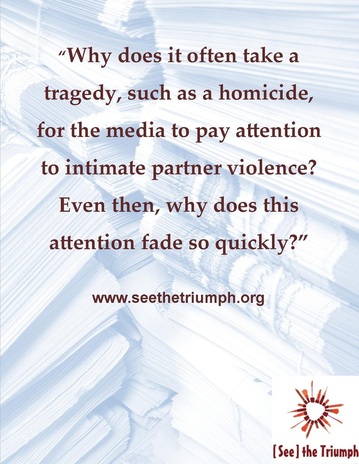|
By Christine Murray, See the Triumph Co-Founder
Where is the public outrage about intimate partner violence? Why does it often take a tragedy, such as a homicide, for the media to pay attention to intimate partner violence? Even then, why does this attention fade so quickly? And why does society pay so much more attention to other women's health issues compared to intimate partner violence? Several years ago, my colleagues in the UNCG Center for Women’s Health and Wellness and I began having conversations about the above questions. It was in October, and we were discussing how October is both Breast Cancer Awareness Month and Domestic Violence Awareness Month. Of course, breast cancer is a major public health issue. And yet, we were struck by the fact that the media is saturated with stories and advertisements about breast cancer during October, making it nearly impossible for anyone not to be aware of all the pink around them. On the other hand, where was the similar attention to domestic violence? This attention was lacking to such a significant extent that we felt certain that many members of the general public probably had no idea that October was also Domestic Violence Awareness Month. We decided to look more into these questions, and we embarked on a study of media coverage in our local newspaper about domestic violence.(1) Of the 26 stories in our local newspaper that discussed specific cases of intimate partner violence, 85% reported on homicides, meaning that domestic violence cases that didn’t result in fatalities were rarely reported. As we were more intentionally observing the media, we noticed many potentially problematic patterns in the ways that intimate partner violence was covered in the media. We suspect that many other advocates, too, have felt similar frustrations about the way that domestic violence is covered, and often is not covered, in their local communities. The media was mentioned by many of our See the Triumph studies’ research participants as one of the sources of the stigma surrounding intimate partner violence. For example, one participant had the following to say: “I think in terms of news media, it seems that women who are abused by a husband, or whatever, are fundamentally weak somehow. That there’s this kind of weakness, like an overwhelming weakness of not being able to cope with the world, or not being able to handle stress, or not being able to properly care for their children, or that sort of thing. That it comes down to a lack of strength or something like that.” In our next blog entry on this subject, Part Two: Media Advocacy Strategies, we’ll explore some of the ways that advocates can work with their local media outlets to help change the public dialogue about intimate partner violence. Look for this post later this week, on Thursday, December 5th! Next week, on Tuesday, December 10th, we’ll wrap up this 3-part series with a post on writing a Letter to the Editor. Resource: (1) Brown, B., Murray, C. E., & Smith, P. H. (2013). Domestic violence representation in media: A toolkit for advocacy professionals. Poster presented at the UNCG Public Health Education internship poster session.
Anonymous
12/3/2013 04:37:28 pm
Weak? Far from it. I was chosen because of my strength, like a challenge to be conquered, a trophy then beaten into submission. I stayed because I was strong, and kept believing the advice that if I only tried harder then he wouldn't do those things to me. An abuser is most gratified usurping his power and control on a person who was already strong and solid. Comments are closed.
|
Archives
July 2024
CategoriesAll About Intimate Partner Violence About Intimate Partner Violence Advocacy Ambassadors Children Churches College Campuses Cultural Issues Domestic Violence Awareness Month Financial Recovery How To Help A Friend Human Rights Human-rights Immigrants International Media Overcoming Past Abuse Overcoming-past-abuse Parenting Prevention Resources For Survivors Safe Relationships Following Abuse Schools Selfcare Self-care Sexual Assault Sexuality Social Justice Social-justice Stigma Supporting Survivors Survivor Quotes Survivor-quotes Survivor Stories Teen Dating Violence Trafficking Transformative-approaches |
Search by typing & pressing enter



 RSS Feed
RSS Feed